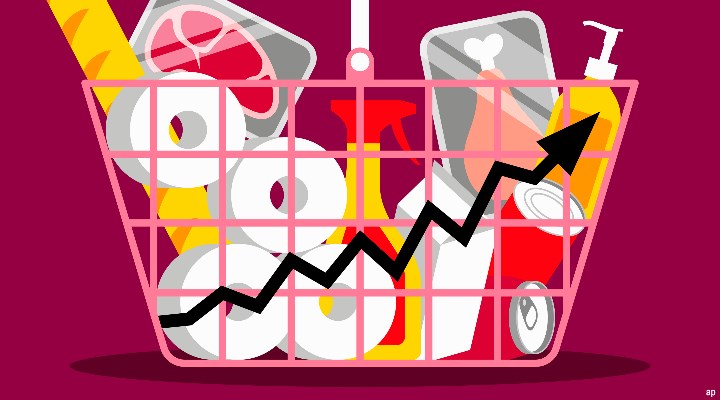
The most obvious problem with inflation is that it erodes wealth. I wrote about this issue way back in May 2020, when inflation had been running at a tepid rate for more than three decades. Since then, inflation has come back with a vengeance: petrol prices are surging, groceries are more expensive, and vehicle prices have spiked.
But the more insidious effect of rising inflation is that it fundamentally erodes trust. This is a highly destructive force that spills over into many different areas, as detailed below.
Savings and Investments
By definition, inflation eats into investment returns, making it more difficult for investors to generate the growth needed to meet their financial goals. As shown in the table below, inflation-adjusted returns on major asset classes are frequently negative during periods of higher inflation. As a result, returns on the classic 60/40 mix of stocks and bonds have often landed in negative territory during inflationary periods.
How does inflation affect investments? The negative effect of inflation on investment returns adds significant uncertainty to the planning process for individual investors, financial advisers, and institutional investors such as pension plans. If I have no idea how much of a toll inflation might take on my future returns, I have no way of estimating how much I might need to set aside to fund future goals.
Planning For Retirement
This is closely related to the previous point. During periods of high inflation, investors may need to set aside a larger percentage of income for retirement savings. At the same time, the rising cost of living can increase the risk of prematurely depleting a retirement nest egg.
As John Rekenthaler has pointed out, higher inflation that takes place during the first five years of retirement can be particularly damaging because it permanently increases the total value of portfolio withdrawals.
How does inflation affect retirement withdrawals? Many retirees rely on portfolio withdrawals to fund a larger percentage of their retirement spending. As we've discussed in the past, inflation is a major swing factor that can affect how much retirees can safely withdraw from their portfolios each year. The classic 4% rule of thumb for retirement withdrawals assumes retirees adjust each year's withdrawal amount for inflation, but an above-average inflation rate may make that strategy untenable.
Rational Purchase Decisions
If I'm making a major purchase, I need to know how much money I have available to spend, how much the item will cost, and how much value it will create relative to other things I could spend money on. Inflation complicates all three of those things. It can also lead to problematic consumer behavior, such as hoarding. If I'm worried that the cost of toilet paper or nutrition bars is only going to trend higher, I might be tempted to load up the cart on my next trip to Costco. This type of panic buying, in turn, can create shortages or fuel further inflation by artificially boosting short-term demand.
Inflation can also complicate the decision-making process for bigger-ticket items. For example, if I've been thinking about replacing my car in the next few years, should I buy now to avoid the risk that prices will be a lot higher 12 months from now? Or take the opposite tack and hold off in the hope that price levels will stabilize? Or maybe with gas prices so high, I don't even need a car at all.
This type of uncertainty not only creates stress for individuals trying to figure out how to spend their money but can lead to unintended consequences by increasing the level of friction in purchase decisions.
Inflation Rewards Debt Financing
The basic math of inflation means that when inflation is rising, a currency's future value is declining. That makes it more attractive for borrowers to pay back debt with money that's becoming worth less and less. This can be beneficial both for households that carry fixed-rate debt such as mortgages and corporations with leveraged balance sheets (not to mention governments faced with ballooning deficits).
Over time, however, higher inflation can hurt borrowers because it's usually followed by higher interest rates, which increase the debt burden for anyone financing new loans or holding variable-rate debt. This can also create friction issues similar to the one I discussed above; the prospect of higher interest rates and uncertainty about future property values can cause buyers to make poor decisions if they rush into buying a house earlier than they otherwise might.
Reasons for hope
Granted, there might be some positive signs that inflation could be easing up. The monthly US Consumer Price Index rose by a significantly smaller rate in April, although it ticked up again with the most recent May report. Recent data from the Labor Department suggests the pace of both job growth and wage growth has been moderating. And as Bloomberg recently reported, prices on some of the underlying components used to produce food, electronics, and transportation – namely fertilizer, some types of semiconductor chips, and shipping containers – have recently eased off their previous highs.
Expectations for future inflation over the next five years have also fallen. Based on spreads between nominal Treasury yields and those on Treasury Inflation-Protected Securities with the same maturity date, the market was pricing in a five-year breakeven inflation rate of 2.76% as of June 6. That's actually a bit below the 3.20% long-term average since 1913.
At this point, investors can only hope that inflation returns to more normal levels relatively soon. In the meantime, it will continue to have far-reaching effects for both consumers and investors.





























